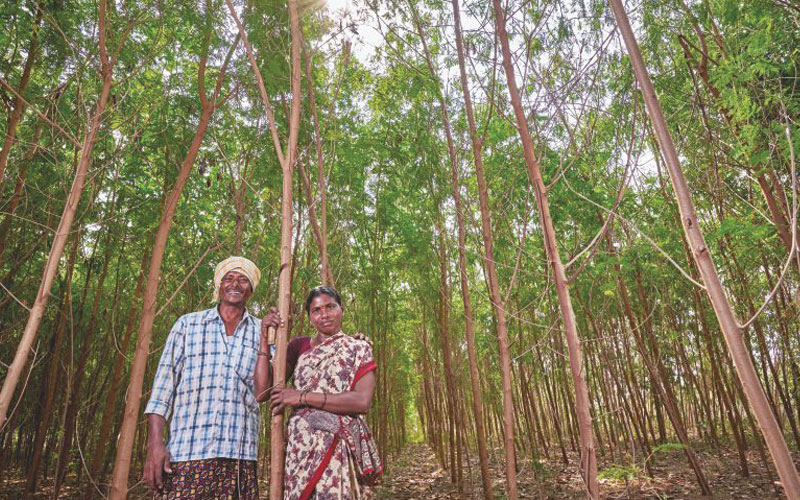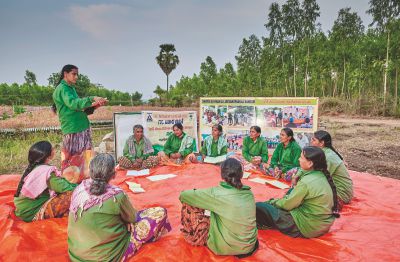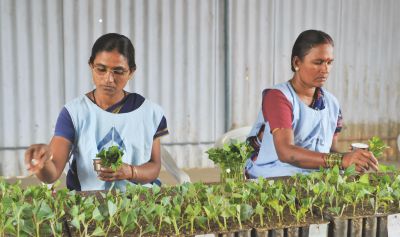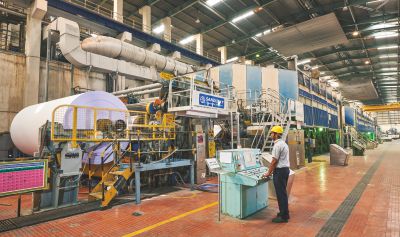ITC is recognized as a global leader in sustainability, marked by numerous milestones achieved through innovative, inclusive, and impactful interventions. ITC’s commitment to sustainability enables it to attain global environmental distinctions, including being Carbon-Positive, Water-Positive, and Solid-Waste Recycling Positive for several consecutive years.
ITC’s Paperboards and Specialty Papers Division (ITC PSPD) is a key driver of the Company’s environmental stewardship. It is India’s largest, most environment-friendly and technologically advanced paper and paperboards business. With a steadfast commitment to integrating sustainability into every facet of its operations, ITC PSPD sets the standard for responsible manufacturing in India. At the core of ITC PSPD’s success story is its unwavering dedication to governance processes that embed sustainability principles into its business strategies, fostering both environmental and social impact. In a recent interaction with Paper Mart magazine, ITC shared its ESG goals and initiatives towards environmental sustainability, social commitment, and setting standards in governance with ethical leadership.

ITC: Pioneering Environmental Sustainability
Afforestation Programme: A Paradigm Shift Towards Sustainability
ITC’s Afforestation Programme, also known as the Social and Farm Forestry Programme, assists farmers in transforming unproductive land assets into profitable pulpwood plantations. Under ITC’s Farm Forestry Programme, farmers who can invest in growing pulpwood are encouraged to grow these on low productivity/degraded landholdings for higher earnings and environmental benefits, using clonal saplings specially developed by ITC R&D to grow in harsh conditions. ITC’s Afforestation Programme has greened over 1 million acres of land till date and sequestered approximately 6 million tonnes of CO₂ in FY23.
Solid Waste Management Programme
The common sight of heaps of waste in towns and cities, the majority of which goes untreated into landfills, poses a serious public health risk, environmental hazard, and represents an enormous waste of resources. Based on the principle of circular economy that re-consumes its waste & inspired by the national mission of Swachh Bharat, ITC has conceived WOW (Well-being out of Waste) as a new model of Municipal Solid Waste Management. The initiative promotes awareness about the importance of source segregation and recycling, and establishes systems to ensure effective practice. It collaborates with local municipalities to train waste workers and rag-pickers in these concepts and to provide an efficient collection system. ITC’s WOW initiative covers over 1,200 municipal wards nationwide. In FY23 alone, approximately 64,000 metric tons of dry waste was collected, benefiting over 2.2 crore citizens across more than 55 lakh households.
In addition, ITC became Plastic Neutral in 2021-22, much ahead of its target by collecting and sustainably managing more than 54,000 tonnes of plastic waste, which exceeded the amount of plastic packaging introduced in the market by ITC during the same period. The Company sustained its Plastic Neutrality status for the second year in a row by sustainably managing 60,000 tonnes of plastic waste in 2022-23, which was more than the amount of packaging introduced in the market by ITC in 2022-23.
Furthermore, the recycling of nearly 100% of the waste generated at ITC PSPD Units, along with the utilization of externally generated paper waste as a fiber source at PSPD Kovai, enabled ITC to achieve an impressive recycling rate of 112% for the waste generated across the Company, thereby maintaining its Solid Waste Recycling Positive status for 16 years in a row.
Leading the Way with Sustainable Packaging Solutions
In response to the growing demand for sustainable packaging, ITC PSPD has leveraged the Company’s R&D capabilities to introduce an exclusive range of Sustainable Paperboards. This range includes Recyclable and Compostable boards tailored for the Food & Beverage Industry and Indoor Branding applications, with the prime objective of replacing single-use plastics.
Among these innovations, the ‘Filo’ series of sustainable paperboards has gained significant traction in the Packaging Industry, both in India and abroad. The Filo series includes FiloBev, FiloPack, FiloServe, and FiloTub, all serving as replacements for single-use plastics and LDPE-coated packaging/disposables in the Food & Beverage industry.

Additionally, the Company has introduced ‘SIGN-UP Green’ – Virgin Solid Boards designed to replace rigid plastics and plastic foam boards in indoor branding materials (POP/POSM).
This portfolio also features OmegaBev Vio, designed for paper cups and Indobowl, designed for takeaway packaging in Quick Service Restaurants.
Going forward, ITC PSPD plans to expand this portfolio by targeting new applications.
Focus on Renewable Raw Materials in Manufacturing
ITC PSPD’s manufacturing units prioritizes the use of renewable raw materials, with over 99% sourced from renewable sources. Initiatives like Social and Farm Forestry ensure the sustainability of its fiber supply while promoting biodiversity and carbon sequestration.
Commitment to Green Technologies
ITC PSPD has made several significant investments in the area of Green Technologies, the latest one being a state-of-the-art High Efficiency Recovery Boiler at Unit Bhadrachalam, which marks the first of its kind in the country. The Boiler boasts of high energy-to-renewable fuel ratio and sets a global benchmark in emission standards, saving substantial amounts of coal and increasing our share of renewable energy. In addition, the Business has implemented more than 42 energy conservation projects in the last three years, substantially reducing its energy consumption. Today, ITC PSPD’s share in Renewable Energy stands at 44%, showing considerable improvement year on year.
Watch: Top Paper Companies 2023
Watershed Development Programme
Water resource management is one of the most critical challenges facing the planet, especially for countries like India where agriculture is the livelihood for a major proportion of the population. ITC’s Watershed Development Programme mobilises Farmers to form water user groups and assists them to plan and carry out interventions such as building micro water harvesting structures to store water, taking various measures to reduce soil erosion, etc. With water available for irrigation and improved soil fertility, farming is less exposed to weather risks and farmers can grow more than one crop in the year. Furthermore, the company has developed rainwater harvesting potential equivalent to over three times the net water consumption in its operations in FY23, enabling it to remain Water Positive for 21 consecutive years.
Environmental Awards and Certifications
ITC’s commitment to responsible sourcing is reflected in its certification and compliance with standards like FSC® Chain of Custody. By ensuring the legal origin of its fiber and promoting sustainable forestry practices, ITC PSPD upholds its role as a leading supplier of certified paper and paperboards in India. Notably, ITC-PSPD obtained the prestigious Forest Stewardship Council® certification in 2010 and was the first paper company in India to receive the FSC® – Forest Management certification in 2012. Currently, all four ITC-PSPD Units are FSC® – CoC certified. ITC PSPD today is a benchmark in India for FSC® certifications and even advises many of its customers who wish to obtain these certifications.
Furthermore, the business’s strong commitment to sustainability earned it the Asia-Pacific Sustainability Award at the IDC Future Enterprise Awards 2023

ITC PSPD’s Unit Kovai is the First Paper Mill in India and Second Globally to achieve Platinum rating – the highest rating – under the Alliance for Water Stewardship (AWS) standards.
Both Unit Bhadrachalam and Unit Kovai have secured the prestigious CII GreenCo Platinum + certification, the highest rating in the system, affirming ITC PSPD’s leadership in environmental stewardship within the pulp and paper industry.
ITC’s Social Commitment: Empowering Communities
ITC’s social initiatives aim to create sustainable livelihoods, support rural development, and enhance community well-being. By investing in programs like Social and Farm Forestry, integrated watershed development, and sustainable agriculture practices, ITC fosters economic empowerment and environmental resilience in rural areas.
Social Forestry Programme
In response to the challenges faced by many Indian farmers who own degraded lands unsuitable for traditional crop cultivation, particularly smallholders, ITC has initiated the Social Forestry Programme. This program promotes tree-based farming as a commercially viable alternative, offering a solution to the limited income generated from these wastelands. By targeting impoverished farmers, especially those motivated to form Forestry Groups, the initiative provides essential support such as access to loans, subsidized clonal stock, technical assistance, and training. Through a buy-back guarantee and a strong emphasis on sustainable practices, the programme equips farmers with the necessary knowledge and resources to enhance their livelihoods while contributing to poverty alleviation. Notably, the programme places deliberate focus on Scheduled Tribe and Scheduled Caste households, recognizing their status as some of India’s most economically and socially marginalized communities.
ITC’s Afforestation Programme has generated over 190 million person-days of employment and supported livelihoods for more than 6 million individuals.
Women’s Economic Empowerment Programme
ITC’s Women’s Economic Empowerment Programme aims to provide opportunities for rural women, especially those in poverty, to earn independent incomes, enhancing their role as decision-makers in their families and communities. This programme has transformed the lives of 29,184 women living in extreme poverty across 8 states. Through 4,192 operational Self-Help Groups (SHGs), over 4.18 lakh women have been trained and linked to Government social security schemes.
Education Initiative for Underprivileged Children
ITC’s Programme aims to create enabling conditions so that more underprivileged children stay in school and complete their schooling, and also to improve learning outcomes so that they have better skills and abilities. To create an atmosphere conducive to learning, the Programme provides infrastructural support to government primary schools – desks and chairs, lights and fans, classrooms and other structural improvements, textbooks and notebooks, sports kits, etc. Sanitation infrastructure is a top priority – separate toilets for boys and girls, drinking water and handwashing stations, etc – are backed by a proactive approach to developing hygienic habits among children.
Also Read: JK Paper: Leading the Charge Towards Sustainable Future
Health & Sanitation Programme
ITC’s Health & Sanitation aims to build awareness on the critical link between sanitation and health so that families come forward with the interest in building toilets for themselves. For maximum impact, campaigns are customised for different groups – men, women, children, community leaders, etc. Community groups – generally women’s self-help groups – are formed and they carry out most of the activities: identifying potential households, providing information and building awareness, managing funds, supervising construction, following up on usage. Families get a loan through the Group to build the toilet but must pay part of the cost. Their financial stake fosters a strong sense of ownership and encourages regular usage.
Apart from the above-mentioned initiatives, other notable ones include the ITC Livestock Development Programme and ITC’s Skilling and Vocational Training programme.
ITC Setting the Standard in Governance with Ethical Leadership
Anchored on the values of trusteeship, transparency, ethical corporate citizenship, empowerment & accountability and control, ITC believes that since large corporations employ societal and environmental resources, governance processes must ensure that they are utilised in a manner that meets stakeholders’ aspirations and societal expectations. For superior Triple Bottom Line performance, ITC’s Governance processes ensure that sustainability principles are embedded in its business strategies and execution plans.

Furthermore, ITC PSPD places significant emphasis on stakeholder satisfaction. Actively seeking feedback and delivering value to stakeholders fosters long-term relationships founded on trust and mutual respect, which are crucial to the company’s success. This customer-centric approach underscores ITC’s dedication to excellence in all aspects of its business.
The practice of Corporate Governance in ITC takes place at three interlinked levels:
- Strategic supervision by the Board of Directors (the Board)
- Strategic management by the Corporate Management Committee (CMC)
- Executive management by the Chief Executives / Chief Operating Officers of Divisions, Strategic Business Units, Business Verticals and Shared Services, assisted by their respective Management / Executive Committees
The ITC Code of Conduct
ITC’s governance framework enjoins the highest standards of ethical and responsible conduct of business to create value for all stakeholders. The ITC Code of Conduct, as adopted by the Board, is applicable to the Directors, senior management and employees of the Company. The Code is derived from three interlinked fundamental principles viz., good corporate governance, good corporate citizenship and exemplary personal conduct in relation to the Company’s business and reputation.
The Code covers ITC’s commitment to CSR and sustainable development, concern for occupational health, safety and environment, a gender friendly workplace, transparency and auditability, legal compliance, avoidance of conflict of interest and the philosophy of leading by personal example. The Code is shared with all new employees at the time of joining the Company and a copy thereof is signed by them affirming compliance with the Code. In addition, all Directors and senior management affirm compliance with the Code on an annual basis. Further, the Code is also shared with the existing employees periodically and their affirmation is taken to reinforce the Code and ensure its Company-wide implementation.

Sustainability Policies
ITC has adopted a comprehensive set of Board approved Sustainability Policies that are being implemented across the organisation in pursuit of its Triple Bottom Line agenda. These Policies are Policy on Stakeholder Engagement, Policy on Responsible Advocacy, Policy on Product Responsibility, Policy on Sustainable Supply Chain and Responsible Sourcing, Policy on Freedom of Association, Policy on Diversity, Equity and Inclusion, Policy on Prohibition of Child Labour and Prevention of Forced Labour at the Workplace, Policy on Environment, Health and Safety, Code of Conduct for Suppliers and Service Providers, Policy on Biodiversity Conservation, Policy on Deforestation, Policy on Resource Efficiency, Policy on Tax, and Policy on Animal Testing. The aforesaid Policies are aimed at strengthening the mechanism of engagement with key stakeholders, identification of material sustainability issues and progressively monitoring and mitigating the impact along the value chain of each Business.
In conclusion, ITC’s ESG goals reflect its holistic approach to business sustainability, encompassing environmental stewardship, social responsibility, and ethical governance.



